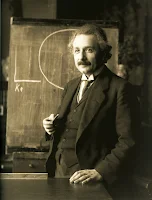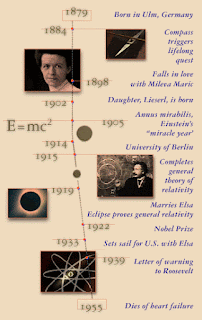Let's Meet Albert Einstein!!!
Ask anyone to name a scientist and you'll probably hear the same name: Albert Einstein. With his famous white hair, recognizable face, and world-changing theories, Einstein is the iconic image of a brilliant scientist.
Albert Einstein was born in Ulm, Germany on March 14, 1879. As a young boy, Einstein was fascinated by the world around him and constantly asked the question: Why? How?
When Einstein was 5 years old and sick in bed, his father brought him a compass to keep him amused while he got better. Einstein was captivated and intrigued by it. No matter how hard he shook, spun, or rattled the compass, the needle would always point north. He wondered what invisible force made the needle always point in the same direction? He could tell that there had to be a force responsible for this behavior. Being a thinker, Einstein wanted to figure out just what that force was. Little did Einstein know that he’d be doing the same sort of thinking and discovering for his entire lifetime.
“I can still remember―or at least I believe I can remember―that this experience made a deep and abiding impression on me." Einstein believed that his childhood fascination with the compass inspired his passion for science. All his life Einstein found school difficult and did not get very good marks (in fact, he once failed a math course). Einstein’s lack of success in school was because he had difficulty concentrating. His mind was constantly racing as he learned about new ideas. Each new idea made him think of new questions and started his “wondering” process. Einstein was always thinking! Einstein completed all his schooling, with challenges here and there, and went on to become the most important and influential physicist that the world has ever seen.
What makes him so great? Einstein is famous for his discoveries about time, light, and gravity and how they affect the universe. His theories changed the world of physics because of his ideas about how things move: from the tiniest particles to the largest galaxies.
For eight years, Einstein struggled to answer the question of how gravity and the universe worked. Einstein’s theory of special relativity made people think of time and space differently.
You may ask, “What is relativity?” Have you ever experienced a time when you were sitting in a smoothly moving car and it seems as if the buildings outside are moving and you are sitting still? Well, they ARE moving, compared with or RELATIVE to you. That’s relativity.
Special relativity describes how motion affects time, length, and mass. The Special Theory makes some unusual predictions. For instance, if a spaceship traveling at nearly the speed of light passes by, it would look shorter and heavier to you, and its clock would run slower. E=mc2 is his famous mathematical equation that shows that energy (E) and mass (M) are different forms of the same thing, linked by the speed of light (c). Einstein also came up with the General Theory of Relativity that says that gravity is a result of space-time being curved in four dimensions! The General Theory is necessary for understanding the structure of the universe and objects such as black holes.
Finding this a little hard to understand? Don’t worry. You’ll learn more about this in high school, college, or university. You should know that scientists working on space travel or nuclear physics today depend on his theories and equations. Einstein’s amazing way of thinking earned him the prestigious Noble Prize, helped astronomers to understand the universe, and led to the discovery of black holes (objects with such gravity so powerful that not even light can escape).
Albert Einstein believed in the power of your imagination and a new way of looking at the universe. He proved how important creativity really is.
Albert Einstein was awarded the 1921 Nobel Prize in Physics for his discovery of the law of the photoelectric effect. Stay tuned for the announcement of the 2020 Physics Prize in a few hours time.








0 Comments